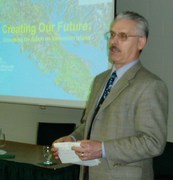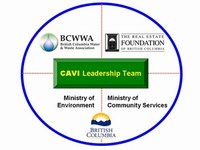Real Estate Foundation funds 'Creating Our Future' on Vancouver Island
Green Value
The Real Estate Foundation of British Columbia (REFBC) is pursuing a strategy to persuade local governments on Vancouver Island to adopt “green value” approaches to planning for and accommodating settlement growth.
“Our goal is to have at least two local governments per year adopt a green value approach to approving development applications and project designs”, notes Tim Pringle, Executive Director.
The REFBC uses the term “green value” as a generic reference to use and conservation of land and real estate that achieves social and economic goals while minimizing harmful effects on ecological assets.
“Healthy communities must be able to draw from the ecology around them resources such as potable water, fertile soil, surface water filtration and recharge, flood control, and so on.  Green value pertains to all scales of reference to land and real estate”, explains Tim Pringle.
Green value pertains to all scales of reference to land and real estate”, explains Tim Pringle.
“For example, the Agricultural Land Reserve Act is province-wide; a watershed, wetland or landscape may be regional or local; real estate development based on a green infrastructure approach may part of an area plan; and green buildings with geo-thermal heating and other technology are site specific as are low-flow toilets in residences.”
Vancouver Island Coast Development Region
In the Vancouver Island Coast Development Region the REFFBC strategy is to support research and educational activities for the public and professionals to enable them to understand the green value context and draw from it practices that will help to deal with challenges in their local context.
One of the programs currently underway is Leadership in Water Sustainability: Convening for Action on Vancouver Island (CAVI). According to Tim Pringle, “In addition to providing core funding for the work of the Water Sustainability Committee, the Foundation is a hands-on partner in CAVI. My Governors have made a multi-year commitment to Vancouver Island because they believe it will take time to truly facilitate transformational change.”
About CAVI
The purpose of CAVI is to provide research and education for practitioners (primarily local government administrators, engineers, planners and elected persons) to plan for  management of sustainable water resources in the context of burgeoning settlement activity. This initiative is supported by the BC Water & Waste Association, Ministry of Environment, Ministry of Community Services, and the Green Infrastructure Partnership, as well as Terasen Gas (now Corix).
management of sustainable water resources in the context of burgeoning settlement activity. This initiative is supported by the BC Water & Waste Association, Ministry of Environment, Ministry of Community Services, and the Green Infrastructure Partnership, as well as Terasen Gas (now Corix).
About Other Initiatives
Currently, the Real Estate Foundation is supporting a number of other projects that address green value concerns in some way:
- The District of Saanichis restoring the Colquitz watershed through a mixed strategy of “designing with nature” and “valuing nature” approaches to development approvals. This project has also received funding from the Federation of Canadian Municipalities, Canada Mortgage and Housing Corporation, and the District of Saanich.
- The Gaining Ground Summit II Conference(June 4-5), which is about sustainable urban development and recognizing the value of natural capital.
- The Green Shores Project is a “Sustainable Approach to Coastal Design and Development.” The initiative “connects people with the shore environment; it delivers triple bottom line (environment, social and economic) benefits; and, it recognizes that site specific, cost effective solutions can only be achieved by using an integrated design approach.”
In addition to providing grant support for these projects, the Foundation has been or will be involved in other activities that advance the green value strategy. Under the CAVI umbrella, for example, the Real Estate Foundation is hosting the Creating Our Future Workshop as an adjunct to the Gaining Ground Summit Conference.
About the Creating Our Future Workshop
This shoulder event is designed to inform decision-makers green value, designing with nature, green infrastructure and water sustainability. The workshop theme is: What will Vancouver Island look like in 50 years? For more information on the workshop program, please click here.
The Real Estate Foundation
The REFBC is a philanthropic organization created in 1985 by an amendment to the Real Estate Act. It is continued under the new Real Estate Services Act, which came into force January 1, 2005. Under the Act, the Foundation’s purposes are: “to undertake and carry out real estate public and professional education, real estate law reform, real estate research and other projects intended for the public or professional good in relation to real estate activities.” The REFBC enjoys wide latitude to interpret and execute its mission as broadly set out in the Real Estate Services Act.

Posted May 2007


